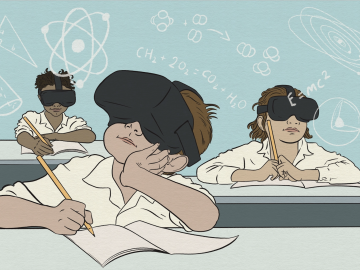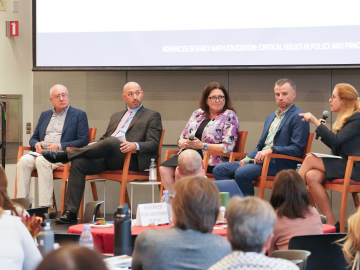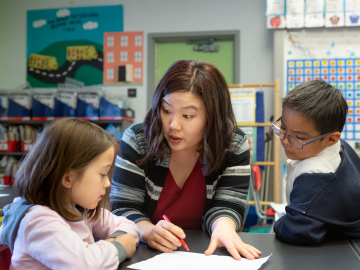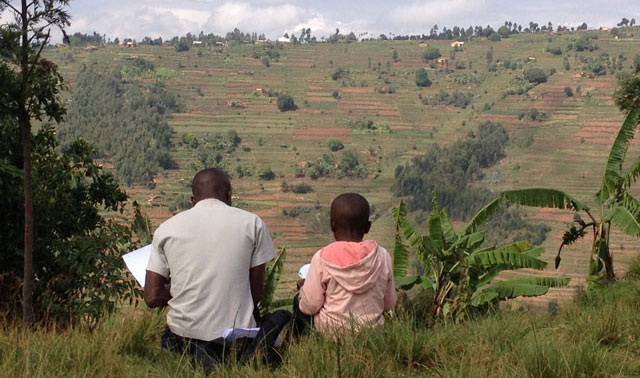

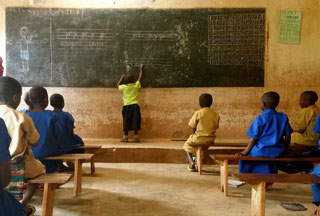





At a small market in the hilly Gicumbi district north of Kigali, Rwanda, there are no visible written signs, no price tags and no chalkboards touting the day’s specials.
Produce is sold not by the kilo, but by the basket: a bigger basket, a higher price; a smaller basket, a lower price. Local children pay vendors from pockets filled deliberately with just the right amount for a specific item in mind. Outside, splayed across a stone wall, a shock of distinctive leaves conveys a message where words don't: avocados for sale.
The market paints a stark portrait of the climate of literacy in this part of rural Rwanda, where education is highly valued, yet many children have little access to reading materials, few opportunities to practice language skills in their communities and no time – and often no support – to read outside the classroom.
The market scene is described in a new, first-of-its-kind study by researchers at the Stanford Graduate School of Education, in cooperation with the government of Rwanda and the nonprofit Save the Children.
The study takes an unprecedented look at home, school and community attitudes around reading, writing and language in rural Rwanda.
"Rwanda has in fact come a long way in recent years in improving literacy," says Elliott Friedlander, the GSE doctoral student who is leading the study. "We want to understand what efforts are working best to help strengthen them and expand their reach."
The research team - which includes Professor Claude Goldenberg and doctoral candidate Saima Malik of the GSE, Michael Tusiime, PhD, of the University of Rwanda, and Janvier Gasana, co-researcher at the Rwanda Education Board - just finished the first phase of what is expected to be a five-year project.
The team has observed teachers and students, surveyed community members and conducted an ethnography of two families, comparing their literacy environments.
"Few studies, if any, offer the detail we provide in our preliminary report. This randomized control trial is a rare, in-depth look at home and community literacy practices in addition to teacher practices and student reading skills in rural Rwanda," Friedlander says.

Flora is 9-years-old. Jolly is a year younger. Flora, who lives on a steep hillside, mostly spends her time out of school doing chores: cooking, fetching water, gathering firewood. There is no time to play. No time, or materials, to read at home.
Jolly, meanwhile, lives at the center of the village, not too far from Flora but not as isolated. Her father is a local teacher. Her mother dropped out of school after fourth grade but is active in the community. She has few chores. It's not uncommon for her to play cards or sing and dance with her six siblings. Reading is encouraged. Writing is practiced.
Flora and Jolly are the subjects of a detailed ethnography conducted by Stanford researchers as part of a study into the culture of literacy in rural Rwanda and methods to boost children's reading skills. (Names are changed and photo is cropped to protect the students' identities.)
Much of the research into the factors related to growing children's reading skills has been conducted in the West, Friedlander notes. This initiative will help inform effective practice in developing nations, where cultures and methods vary dramatically from western settings.
"This is a terrific and wonderfully ambitious project, and it's in an area that is in great need of initiatives such as this," says Goldenberg. "Elliott’s done an amazing job designing and carrying out the study. His contribution was a major reason why the project was even funded."
The baseline assessments form the foundation for the rest of the study. Over the next few years, the research will assess interventions aimed at improving literacy to see what is most effective.
The scholars are specifically looking at the methods used in Save the Children's Literacy Boost program, which Friedlander helped develop and implement with Stanford alumna Amy Jo Dowd, Senior Director of Education Research, and others at the nonprofit.
Literacy Boost has been rolled out in 24 countries, including parts of Rwanda, and helps children learn to read through initiatives such as teacher training, providing books and other materials and promoting community reading activities. Friedlander continues to collaborate with Save the Children on education related research projects outside Rwanda.
"We knew that Literacy Boost produced significant reading gains for the children in the program, but we couldn't be sure which aspects of our interventions had the greatest impact. We didn't have the data to differentiate the added value of community literacy activities versus school focused activities," he says. "Now we will."

Some of what the research team aims to find out over the next few years of study is the effects on children's reading development of teacher training alone and teacher training combined with home and community literacy activities. They will also examine reading pedagogy and whether it changes after teacher training. Additionally, researchers want to find out whether beliefs and attitudes around reading evolve when communities have access to information and resources, and what efforts and interventions are sustainable.
As Save the Children implements the Literacy Boost program in the Gicumbi district, the research team plans to re-assess the children year-on-year to mark progress. Some of the efforts by SC include teacher training sessions, reading clubs for children and reading awareness workshops for adults.
"We can use this research to guide programs like Literacy Boost," Friedlander says. “If the findings confirm our hypothesis on the importance of the home literacy environment in the developing world context of rural Rwanda, we hope to use it to help children and their families to read better and earlier, and to grow the love of reading. The combined focus on the schools, teachers, communities, and families will hopefully help Rwanda grow a generation of readers.
The study called, "Literacy Boost in Rwanda: A Randomized Control Trial," is funded by Comic Relief, a UK charity. The research collaboration includes the GSE and the Rwanda Education Board. Save the Children and Umuhuza, a local non-governmental organization in Rwanda, are responsible for program implementation and assisted with some data collection and supervision.
Additional support was provided by GSE doctoral students Erin Raab and Kijoo Cha, who contributed to early research activities, and Professor Ed Haertal, Friedlander's co-adviser, who provided important technical support in designing the study and analyzing data.
Andrew Myers writes frequently for websites and publications of Stanford Graduate School of Education.
Subscribe to our monthly newsletter.
Stanford Graduate School of Education
482 Galvez Mall
Stanford, CA 94305-3096
Tel: (650) 723-2109
© Stanford University, Stanford, California 94305.

